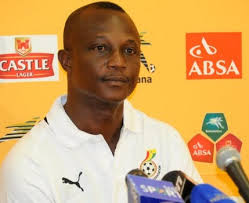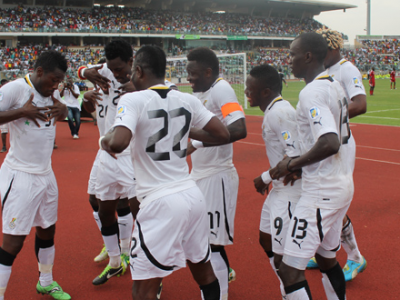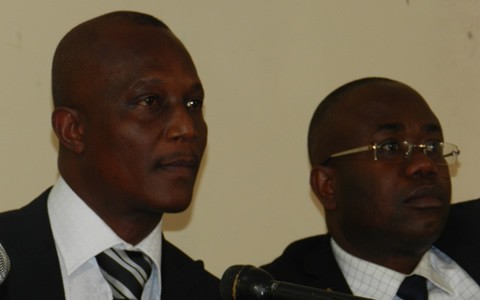 Here they go again, at the top of their lungs proclaiming: “crucify him, fire him, he is incompetent, hire a white coach; oh no! appoint (foreign) technical director” to oversee his—Akwasi Appiah—work so Ghana soccer problems will all disappear instantly and the country will go on to win the African Nations Cup that has eluded the nation over the past thirty decades. So, the buck-passing and the wishful thinking among many Ghanaians go on while at the same time they ignore the root causes of Ghana’s ill-fated participation in the FIFA 2014 World Cup in Brazil. In fact, for those Ghanaian fans who embrace realities in contemporary soccer in general, their criticisms toward the Black Stars’ failure in Brazil tended to be relatively measured. For other critics, buried deep in their arguments are tribal sensibilities and sheer dislike of the idea that Ghana has a native coach and not oboroni calling the shots.
Here they go again, at the top of their lungs proclaiming: “crucify him, fire him, he is incompetent, hire a white coach; oh no! appoint (foreign) technical director” to oversee his—Akwasi Appiah—work so Ghana soccer problems will all disappear instantly and the country will go on to win the African Nations Cup that has eluded the nation over the past thirty decades. So, the buck-passing and the wishful thinking among many Ghanaians go on while at the same time they ignore the root causes of Ghana’s ill-fated participation in the FIFA 2014 World Cup in Brazil. In fact, for those Ghanaian fans who embrace realities in contemporary soccer in general, their criticisms toward the Black Stars’ failure in Brazil tended to be relatively measured. For other critics, buried deep in their arguments are tribal sensibilities and sheer dislike of the idea that Ghana has a native coach and not oboroni calling the shots.
Certainly, as a head coach if a team’s performance fails to live up to expectations, fans have every right to question and critique the competence or the overall strategy including the game plans of the technical bench. All these are legitimate viewpoints which demand careful and impassioned evaluation. However, in an effort to embark on self-examination to figure out what went wrong in Brazil, engaging in personal insults and jumping into hasty conclusions will not help Ghana finds workable solutions. Similarly, uncritically clamoring for a foreign technical director or a white coach will not necessarily yield the desired outcome.
In Ghana and in many parts of Africa, whenever problems come up often many people start witch-hunting, and some rush to uninformed conclusion to muddy the waters so the underlying problem(s) may never be clearly identified and solved. Whatever happened in Brazil leading to the Black Stars’ substandard performance had a complex context. Hence, it is unfair to put Akwasi Appiah solely at the receiving end of the blame, but ignore the disingenuous hypocrisy on the part of the Ghanaian soccer policymakers and also the arrogant, ungrateful, so-called senior players who are pretending as if they did not help create the whole mess in Brazil.
Based on what many of us know now, the Black Stars players’ main contention was about appearance fees or monetary promise not kept. As a result, some of the so-called senior players, led by Muntari, Kelvin Boateng but secretly orchestrated by the “catalyst-in-chief” Michael Essien, rebelled against Ghana (FA) demanding to be paid before even agreeing to any pre-match team strategy session in Brazil. Given this non-committal attitude in the heels of the Ghanaian players’ mutiny in Brazil, even if the Black Stars had had the German national soccer coach (Joachim Loew) or Pep Guardiola at the time, Ghana would probably still not make it out of the group stage of 2014 World Cup. Many of the players’ issues were psychological and their state of mind as opposed to lack of tactical approach by the coach. The fact is Akwasi Appiah has been unlucky to be caught in the crossfire of an age-old soccer minefield waiting to explode at anytime.
It is quite disturbing that many of us at this point in time still do not want to face realities perhaps because of some tribal affiliations and unexamined support for a particular player or people. Certainly, we may all agree on the mismanaged culture and deplorable attitude of the Ministry of Sports and GFA toward soccer development in Ghana. Nonetheless, one significant fact we need to embrace is that in modern soccer if the players’ commitments, morale, and discipline are low because of some unfulfilled monetary reward, no coach in this universe can accomplish any remarkable result with these disillusioned players.
Indeed, the aggrieved Black Stars players had a good case but some of us still question the means by which they used to achieve their ends in Brazil of all places. Let me repeat: what these must be mindful of is that they represent Ghana and not GFA or any Ghanaian sports official. Why couldn’t the players have waited till everything was over; came back home and called for a huge press conference and laid down all their grievances for the whole world to hear about their mistreatment at the hands of the corrupt GFA and the Sports Ministry? Here, the players such as Essien, Muntari, Kelvin Boateng and some other old guards cannot escape blame for the disappointment and shame they brought to bear on Ghanaian soccer fans.
The question worth analyzing is that assuming Akwasi Appiah had featured Essien, KPB, Muntari, and Kwarasey in all the three matches the Black Stars played in Brazil, would these players still had instigated the mutiny in the Ghanaian camp because of 100 or 200 thousand dollars unpaid appearance fee? Your dispassionate response may be as good as mine. I would not be surprised these players individually have assets worth more than one million dollars; so, this meager appearance fee should not have been a big deal to professional footballers of their caliber. This does not mean they should not be paid what money was due them.
If anyone were to solicit my honest opinion about the major causes of the Black Stars’ poor performance in the 2014 World Cup tournament in Brazil, my response will be that the Ghanaian soccer leaders, as usual, were clueless and not honest in their dealing with the players. As a head coach, Akwasi Appiah is stuck in the web of the monetary agitation and indiscipline of the players on one hand and the Ghanaian soccer officials on the other. Also keep in mind that some of these senior players were disappointed that the coach did not give them more playing time to selfishly advertize themselves to the soccer world that they have not reached their wits’ end yet. Needless to say, the Black Stars Management Team’s dishonest tactics provided an opening for those disenchanted players in the national team to vent their frustrations, and in the process sabotaged their coach and the younger players’ effort to become more famous in the world stage.
Akwasi Appiah may not be good to some Ghanaians, but let us not forget that he was the first Ghanaian coach ever to help the country’s senior soccer team qualify for the World Cup in 2014! It is also a fact that the ultimate winners of the 2014 World Cup (Germany) beat every team except tactically disciplined Ghanaian team coached by Akwasi Appiah. The Germans were lucky to tie the match with Ghana. Did anybody realize the big difference a highly-motivated and disciplined team could accomplish when Ghana played Germany? The Black Stars’ poor show in Brazil is not about the hiring of a technical director or the dismissal of Akwasi Appiah. He needs more time to develop the team. After all, the 2014 World Cup host Brazil of all teams were soundly beaten in their own backyard by Germany. The services of a foreign technical director will not make much difference till the systemic corruption and the greed prevalent at the corridors of GFA and the Sports Ministry are brought under control. And, yes, some of the players need to show discipline and humility. These are the realities!

